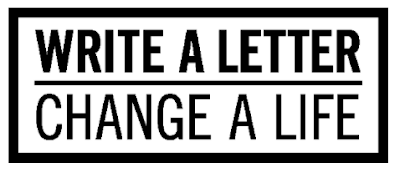I recently finished an excellent book called Digital Minimalism: Choosing a Focused Life in a Noisy World. (I have a review in drafts... coming soon-ish.) My usual time crunch plus thinking about this book gave me an idea for a new personal challenge: substitute 15 minutes of social media per day with one human-rights letter, on paper.
Rather than scrolling through my friends' updates and the latest hilarious memes, I'll visit the Write for Rights Canada homepage, choose one case, and write one letter.
I'll do this once a day, every day, for 10 days, until I've written a letter for every case.
I invite you to join me in this challenge.
Why do we need Write for Rights? Look at the case thumbnails.
Why is this a good thing to do with your time? Wmtc W4R 2019:
All through this year, I've been struggling with cynicism and despair about the state of our planet and the state of democracy. So even though all the warm and fuzzy reasons I've listed in the past (and below) are true and valid, the most important reason to Write For Rights is deadly serious. The world is seriously fucked up. Many, if not most, of us who care about the world feel helpless in the face of such enormous, complex, and intractable problems. Whether or not we will collectively succeed in making a difference on a global scale, we can each make a difference on an individual scale. Amnesty International provides us with an opportunity to do that.
Why is this a great form of activism? I originally wrote this in 2014, and since then I've been recycling it annually. I tell myself that rather than come up with something new, I'll use the time to Write for Rights.
1. It's easy. Amnesty makes it really easy to participate. Read, type, send.
2. You can do do it from any computer. No meetings to attend, no schedule to keep. Just more of something you do all the time anyway: typing.
3. It's free. No need to donate money. The most this will cost you is postage.
4. You'll feel good about yourself. Enjoy that warm buzz you get from voluntarily helping other people. There's nothing quite like it.
5. You can choose how much to participate. Write one letter, write two letters, write three. Spend 10 minutes writing or spend an hour.
6. You can choose what to focus on. Write about an issue in your own country. Write about an issue in your country of origin. Write for children, or for women, or for LGBT people, or for workers, or for environmental activists, or for another issue that you care about.
7. You're busting stereotypes. We supposedly live in a selfish age where all we care about is I, me, mine. Challenge yourself to say it ain't so.
8. It works globally. Every fight against injustice begins with someone shining a light in a dark place. Be that light.
9. It works locally. When political prisoners are released, they often attest to the difference letters from strangers made in their lives: that knowing they were not forgotten helped them survive.
10. You enjoy your own human rights every day. Why not use them to help someone who can't? It doesn't take much time. It's not difficult to do. And it works.
If you're joining W4R from Canada, these are the cases being highlighted this year. I really appreciate that Amnesty Canada always includes a human rights violation taking place at home. These usually involve Canada's unacceptable treatment of Indigenous people. This year, however, it focuses on Prime Minister Trudeau's obstruction of global vaccine equity.

No comments:
Post a Comment